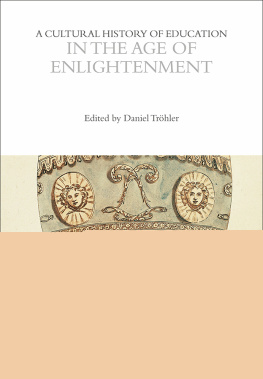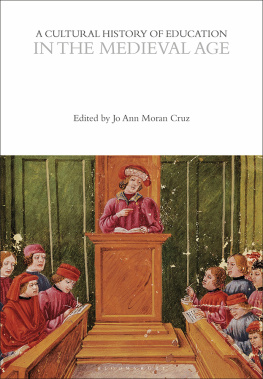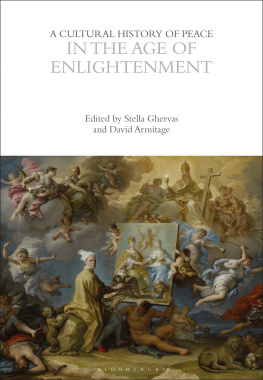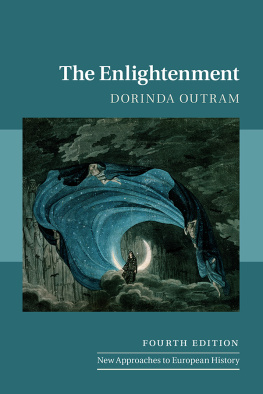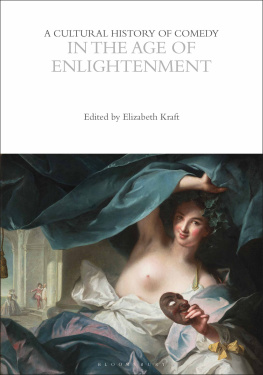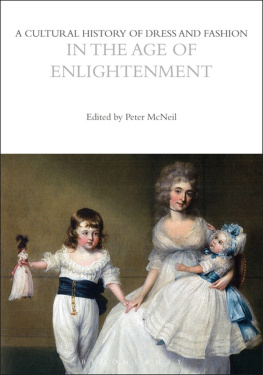A CULTURAL HISTORY OF EDUCATION
VOLUME 4
A Cultural History of Education
General Editor: Gary McCulloch
Volume 1
A Cultural History of Education in Antiquity
Edited by Christian Laes
Volume 2
A Cultural History of Education in the Medieval Age
Edited by Jo Ann H. Moran Cruz
Volume 3
A Cultural History of Education in the Renaissance
Edited by Jeroen J.H. Dekker
Volume 4
A Cultural History of Education in the Age of Enlightenment
Edited by Daniel Trhler
Volume 5
A Cultural History of Education in the Age of Empire
Edited by Heather Ellis
Volume 6
A Cultural History of Education in the Modern Age
Edited by Judith Harford and Tom ODonoghue
A CULTURAL HISTORY OF EDUCATION
IN THE AGE OF ENLIGHTENMENT
VOLUME 4
Edited by Daniel Trhler

CONTENTS
Daniel Trhler
Mette Buchardt
Stefan Ehrenpreis
Paula S. Fass
Claudia Opitz-Belakhal and Sandro Guzzi-Heeb
Rachel Dunn
Rebekka Horlacher
Steven Cowan
Lukas Boser
Bloomsbury Cultural History of Education
Education has not always been well recognized as being central to cultural history. Even the leading British cultural historian, Peter Burke, could omit education from his own list of the inner circle of neighboring forms of history and related disciplines, despite its importance in much of his own work. According to Burke, this inner circle of neighbors included intellectual history, social history, political history, history of science, history of art, history of literature, history of the book, history of language, history of religion, classics, archaeology, and cultural studies. This six-volume series, the Bloomsbury Cultural History of Education, seeks to build expansively on these essential insights.
After the Second World War, there were a number of historical texts that sought to explain educational changes since Greek and Roman times. Internationally, for example, the International Standing Conference for the History of Education (ISCHE) supports an annual conference and a journal, Paedagogica Historica. There are national societies around the world with their own conferences and journals, including the USA, the UK, France, Australia, and many others. However, these have often tended to promote specialist research in particular areas rather than broad synthesis.
Indeed, this process of increased specialization has tended to be both horizontal and vertical in nature. Horizontally or laterally, as it were, journal articles often are only able to engage with relatively narrow aspects or historical contexts in a detailed manner. They have tended also to be largely confined to study of the local or national picture, although recent transnational research has provided a significant corrective to this. Vertically, they largely eschew a longer-term framework for the field conceptualizing continuity and change since ancient times. They have also increasingly concentrated on the most recent periods, the nineteenth and twentieth centuries, rather than on earlier ages.
The current project offers a form of coherence and indeed synthesis in the history of education. Perspectives based on the cultural history of education promise to highlight continuity over time and the resilience of practices, values, and ideas. As one collection of articles based on an international historical conference has concluded, There may be remarkable periods of stability for cultural and educational formations and the role they play in the making of particular ethno-national-religious communities, even though there is also seemingly inevitable challenge, reform, sometimes regressionalways change. In this respect, the Bloomsbury Cultural History of Education series offers both a general synthesis of recent international research and an overall conceptual framework linking together different epochs, to inform and stimulate further work in the field.
Early work in the cultural history of education arose from a new approach to the history of education that fought against its traditional preoccupation with the growth of national systems of modern schooling, while embarking on a wholesale revision of its key aims and aspirations.
This was a set of processes more limited than terms such as socialization or enculturation might imply.
Nevertheless, it undoubtedly takes the idea and practice of education, in Cremins words, beyond schools and colleges to the multiplicity of individuals and institutions that educateparents, peers, siblings, and friends, as well as families, churches, synagogues, libraries, museums, summer camps, benevolent societies, agricultural fairs, settlement houses, factories, radio stations, and television networks. The organization of chapters in the current serial production owes more than a little to Cremins classic design.
Cremins approach to the cultural history of education has often been criticized, both for its practical limitations and for its extensive vision. For some, he appeared so preoccupied with the many informal educational institutions of modern society that he allowed too little space to accommodate the growth of modern schooling. For others, such as Harold Silver, the project was itself a perilous pursuit:
The attraction and importance of extending the history of education into such fields as the history of the press and the modern media, church activities and popular culture, are obvious. So are the dangers, with the possibility of the emergence of an amorphous history which fails to locate discrete educational institutions in a clear relationship with other processes, and also fails to establish acceptable and understandable definitions of wider educational territories.
Its application to the United States since the late eighteenth century was itself an ambitious undertaking. In the current volumes, such a project must be scrutinized against the widest possible canvas of time and space, from ancient times to the present.
The past generation has witnessed the rise of cultural history in its many forms and variations.
Key examples of research on the cultural history of education in the past two decades include that of Harvey Graff and others, who have understood the history of literacy in terms of its social and cultural practices.
These key themes are explored in depth in the six volumes of the Bloomsbury Cultural History of Education series. My warmest thanks go to the volume editors who have each produced excellent collections of original essays by leading researchers in this burgeoning field, to the contributors of these essays that navigate and interpret such broad areas of territory, and to the publishers for their patience and support as this project has developed.
Gary Mcculloch
Brian Simon Professor of History of Education
UCL Institute of Education London
December 2019
DANIEL TRHLER
Todays dominant ways of reasoningat least about politics, social organization, and educationdraw many of their certainties from what is labeled the Enlightenment. Indeed, Enlightenment seems to embody almost everything that modern reasoning relies upon: ideas of progress, emancipation, liberty, freedom, justice, democracy, reason, morality, tolerance, good nature, protected childhood, andsomewhat in the center of them alleducation as a technology to put into practice these ideas, which were advocated as true and good human potentials.
Yet, there is no agreement on what the Enlightenment is, and even the question of its essence may be misleading. To be sure, this question was (provocatively) raised in 1783 by the Lutheran priest Johann Friedrich Zllner, and it was addressed by several actors of the Prussian Enlightenment, among others by Moses Mendelsohn and, most famously, by Immanuel Kant.
Next page
